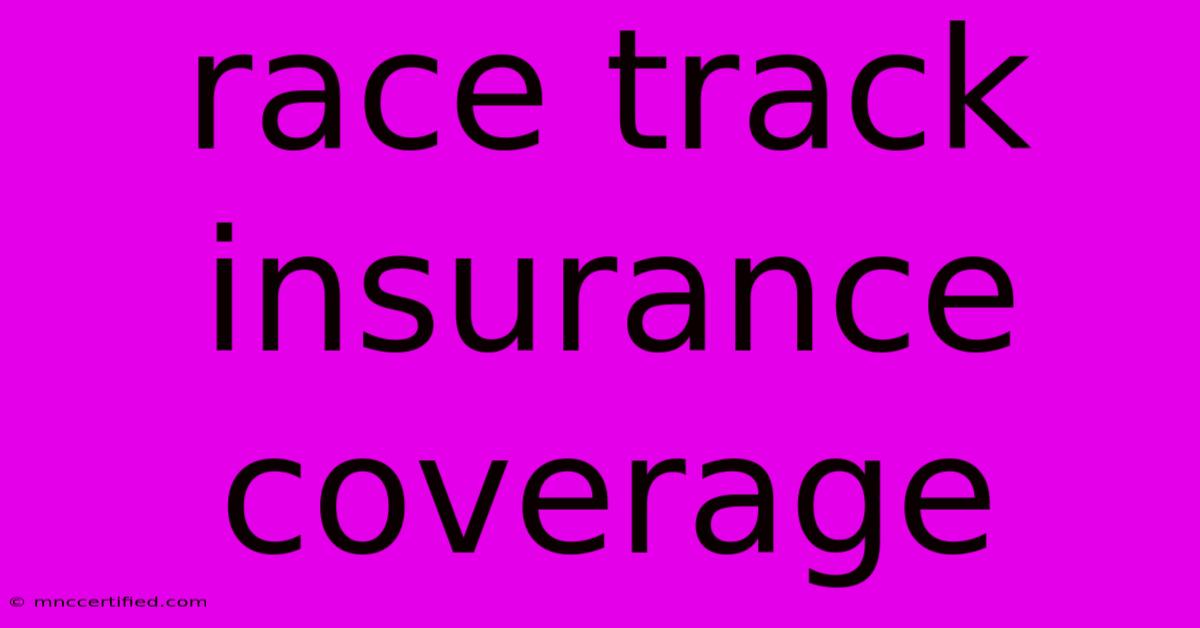Race Track Insurance Coverage

Table of Contents
Race Track Insurance Coverage: Protecting Your Passion and Investments
Racing, whether professionally or as a passionate hobby, involves significant risks. From high-speed collisions to equipment malfunctions and even spectator injuries, the potential for accidents and resulting financial liabilities is substantial. That's why securing the right race track insurance coverage is crucial for protecting your assets, your team, and your future. This comprehensive guide explores the various types of insurance necessary for race track activities and helps you understand what to look for when securing your policy.
Types of Race Track Insurance Coverage
The insurance landscape for race tracks and racing activities is multifaceted. Understanding the different types of coverage is essential to ensuring adequate protection. Here's a breakdown of key areas:
1. Liability Insurance: The Foundation of Protection
Liability insurance is the cornerstone of any race track insurance policy. It protects you from financial losses resulting from third-party claims of bodily injury or property damage caused by your racing activities. This includes:
- Bodily Injury Liability: Covers medical expenses, lost wages, and pain and suffering for individuals injured due to your negligence or the negligence of your team.
- Property Damage Liability: Covers damage to another person's property caused by your racing activities, such as damage to another vehicle, track infrastructure, or spectator belongings.
Why it's crucial: A single accident could lead to substantial legal fees and compensation claims, potentially bankrupting you without adequate liability insurance. This is particularly important for race track owners and organizers who bear a significant responsibility for the safety of participants and spectators.
2. Vehicle Insurance: Protecting Your Racing Investment
Your racing vehicle represents a significant financial investment. Specialized vehicle insurance policies cater specifically to the unique risks associated with racing, covering:
- Collision Coverage: Covers damage to your vehicle resulting from accidents, even if you are at fault.
- Comprehensive Coverage: Protects against damage from non-collision events such as theft, vandalism, or fire.
- Racing Specific Coverage: Some insurers offer endorsements to cover damage specifically related to racing activities, such as damage sustained during a race or practice session.
Choosing the right policy: Consider the value of your vehicle and the level of risk involved in your racing activities when selecting coverage limits.
3. Event Cancellation Insurance: Mitigating Unexpected Losses
Unforeseen circumstances like severe weather, track closures, or even driver injury can force the cancellation of a racing event. Event cancellation insurance can protect you from financial losses incurred in such situations.
Key considerations: Ensure the policy covers the specific reasons for cancellation that are relevant to your events. Carefully review the policy's exclusions and limitations.
4. Workers' Compensation Insurance (If Applicable): Protecting Your Team
If you employ mechanics, crew members, or other staff, workers' compensation insurance is essential. It covers medical expenses and lost wages for employees injured on the job.
Legal compliance: This insurance is often mandated by law and protects your business from potential lawsuits from injured employees.
Finding the Right Race Track Insurance Provider
Selecting the right insurance provider is crucial. Consider these factors:
- Specialization: Look for insurers with experience in the racing industry who understand the specific risks involved.
- Coverage Options: Ensure the policy provides comprehensive coverage that meets your specific needs and budget.
- Customer Service: Choose a provider with excellent customer service and readily available support.
- Claims Process: Understand the insurer's claims process and how quickly they respond to claims.
- Premium Costs: Compare quotes from multiple insurers to find the best value for your money.
Off-Page SEO Considerations: Building Your Online Authority
To further enhance the reach and impact of this article, consider these off-page SEO strategies:
- Guest Blogging: Contribute articles on racing and insurance to relevant automotive blogs and websites.
- Social Media Marketing: Share the article on social media platforms frequented by racers and enthusiasts.
- Forum Participation: Engage in online forums and communities related to racing, offering expertise and subtly promoting your content.
- Backlink Building: Seek backlinks from reputable websites in the racing and insurance industries.
By understanding the different types of race track insurance coverage and implementing effective SEO strategies, you can safeguard your investment, protect your team, and ensure a secure future in the exciting world of motorsports. Remember, consulting with an insurance professional is highly recommended to determine the specific coverage tailored to your unique circumstances and risk profile.

Thank you for visiting our website wich cover about Race Track Insurance Coverage. We hope the information provided has been useful to you. Feel free to contact us if you have any questions or need further assistance. See you next time and dont miss to bookmark.
Featured Posts
-
What Is Spouse Life Insurance
Nov 28, 2024
-
Buy Crypto With Discover Card
Nov 28, 2024
-
Desmet Insurance South Dakota
Nov 28, 2024
-
Grounding And Bonding Diagram
Nov 28, 2024
-
How Much Is Tractor Insurance
Nov 28, 2024